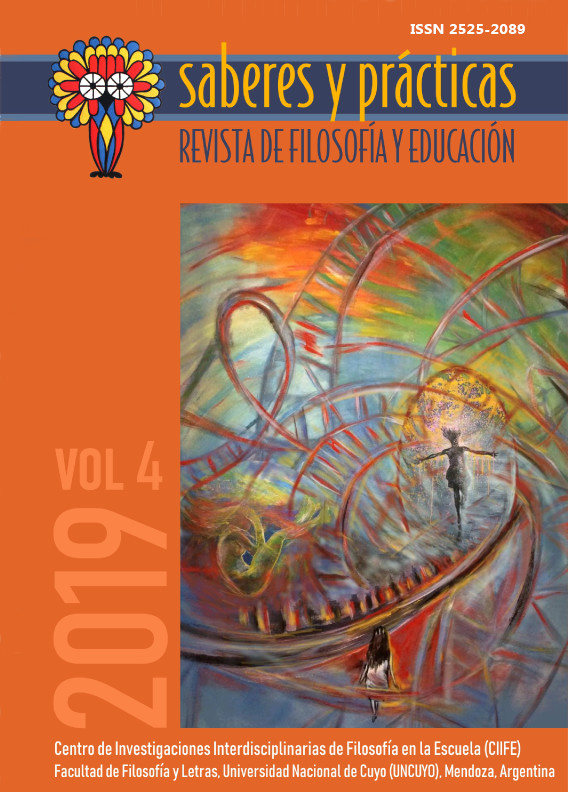Theatrical practices and Specific Language Disorders (SLD): new forms of teaching for inclusion. The case of the A-lafken College
Keywords:
Inclusion, SDL, Pedagogical innovation, Linguistic skillsAbstract
Children with learning difficulties and/or disabilities are social actors who manage to intervene in the world when their differences are valued and respected, thus allowing them to participate as well as people without disabilities. From the point of view of the social model of the disability, it is necessary to contemplate the equal fulfillment of the Human Rights, with the intention of eliminating the social and educational barriers. Consequently, it is essential that educational establishments look for alternatives to eradicate barriers that could affect the integral development of the human being. In the case of Chile, one of the most prevalent learning difficulties is Specific Language Disorder (SLD). However, there are still difficulties in terms of methodological strategies for its psycho-pedagogical intervention. For this reason, this research aimed to investigate theatrical practices, as a learning strategy within the subject of language and communication, in order to reveal whether this type of strategy could reduce the difficulties associated with SDL. The approach of the research was of a qualitative type under a case study design, with students of the first basic year, from the A-lafken School in the district of Penco (Concepción, Chile). The findings demonstrate unexplored potential in theatrical practices as a type of methodological strategy that allows students with SLD to develop language skills.
Downloads
References
Auza, Alejandra, y Peñaloza, Christian. 2019. Factores individuales y familiares en el Trastorno del Desarrollo del Lenguaje (TDL). Ciencias Sociales y Humanidades 86:41-66.
Bishop, Dorothy. 2014. Ten questions about terminology for children with unexplained language problems. International Journal of Language and Communication. Disorders 4: 381-415.
Bona, César. 2016. Las escuelas que cambian el mundo: porque una nueva educación no es un sueño, es una realidad. Barcelona: Plaza Janés.
Bona, César. 2015. La nueva educación: los retos y desafíos de un maestro de hoy. Barcelona: Plaza Janés.
Carborell, Jaume. 2016. Pedagogías del siglo XXI: alternativas para la innovación educativa. Barcelona: Octaedro.
Castro, Julia, y Uribe, Marta. 1998. La educación somática: un medio para desarrollar el potencial. Educación física y deporte 1:31-43.
Delors, Jacques. 1996. La educación esconde un tesoro. Informe a la Unesco de la Comisión Internacional sobre la Educación para el Siglo XXI (compendio). Unesco.
Fresneda, María Dolores, y Mendoza, Elvira. 2005. Trastornos Específicos del Lenguaje: concepto, clasificaciones y criterios de identificación. Neurología 41:51-66.
Godoy, María, y Mesa, María. 2004. antecedentes históricos, presente y futuro de la educación especial en Chile, Mineduc, Programa de Educación Especial. http://especial.mineduc.cl/wpcontent/uploads/sites/31/2016/08/201304151210180.oc_Antecedentes_Ed_Especial.pdf
Hernández, Roberto, Fernández, Carlos, y Baptista, Pilar. 2006. Metodología de la investigación. México: McGraw-Hill.
Laferriére, George. 1999. La pedagogía teatral, una herramienta para educar. Intervención socioeducativa 13:54-65.
Ministerio de Educación de Chile. 2015. Decreto Nº83. Aprueba criterios y orientaciones de Adecuaciones Curriculares para estudiantes con Necesidades Educativas Especiales en Educación Parvularia y Educación Básica. http://especial.mineduc.cl/wp-content/uploads/sites/31/2016/08/Decreto-83-2015.pdf
Ministerio de Educación de Chile. 2010. Ley Nº 20.422. establece normas sobre igualdad de oportunidades e inclusión social de personas con discapacidad. https://www.senadis.gob.cl/pag/195/1432/ley_n20422
Ministerio de Educación de Chile. 2009. Decreto Supremo Nº170. Fija normas para determinar los alumnos con Necesidades Educativas Especiales que serán beneficiarios de la subvención para educación especial. https://especial.mineduc.cl/wp-content/uploads/sites/31/2018/06/DTO-170_21-ABR-2010.pdf
Ministerio de Educación de Chile. 2002. Decreto Nº1300. Aprueba planes y programas de estudios para alumnos con Trastornos Específicos del Lenguaje. http://especial.mineduc.cl/wpcontent/uploads/sites/31/2016/08/201304231710590.DecretoN1300.pdf
Rodríguez, Gregorio, y García, Gil. 1999. Metodología de la investigación cualitativa. Málaga: Aljibe.
Rodríguez, David y Jordi Valldeoriola. 2009. Metodología de la investigación. Barcelona: UOC.
Roqueta, Andrés, y Clemente, Ana. 2010. Dificultades pragmáticas en el Trastorno Específico del Lenguaje. El papel de las tareas mentalistas. Psicothema 4:677-683.
Sandín, María Paz. 2003. Investigación cualitativa en educación. Fundamentos y tradiciones. Madrid: MacGraw-Hill.
Tambyraja, Sherine, Schimitt, Mary Beth, Farquharson, Kelly, & Justice, Laura. 2015. Stability of Language and Literacy Profiles of Children With Language Impairment in the Public Schools. Language, and Hering Research 58:1167-1181.
Trozzo, Esther y Bagnato, Laura. 2010. Inter-acción: lenguaje oral y pedagogía teatral. Huellas: búsqueda en artes y diseño, 7:137-144.
Trozzo, Esther. 2004a. Dramaturgia y escuela I. obras teatrales para niños y propuestas didácticas de abordaje de los textos, Instituto Nacional del Teatro. Universidad Nacional de Cuyo, Mendoza.
Trozzo, Esther. 2004b. Dramaturgia y escuela II. Obras teatrales por, para y con adolescentes. Mendoza: Instituto Nacional del Teatro, Universidad Nacional de Cuyo.
Unesco. 1990. Declaración mundial sobre Educación para Todos y Marco de acción para satisfacer las necesidades básicas de aprendizaje. Nueva York: WCEFA.
Vargas, Santiago. 2010. Aprender enseñando: nuevas metodologías en el área de la expresión gráfica, Granada-España. 297-302.
Vigostky, Lev. 2004. Imaginación y creación infantil. Cuba: Pueblo y Educación.
Downloads
Published
How to Cite
Issue
Section
License

This work is licensed under a Creative Commons Attribution-NonCommercial-ShareAlike 2.5 Argentina License.









